COP26 misses deadline for climate deal but talks continue
British PM Boris Johnson urges rich countries to put more ‘cash on the table’ to secure climate crisis breakthrough.
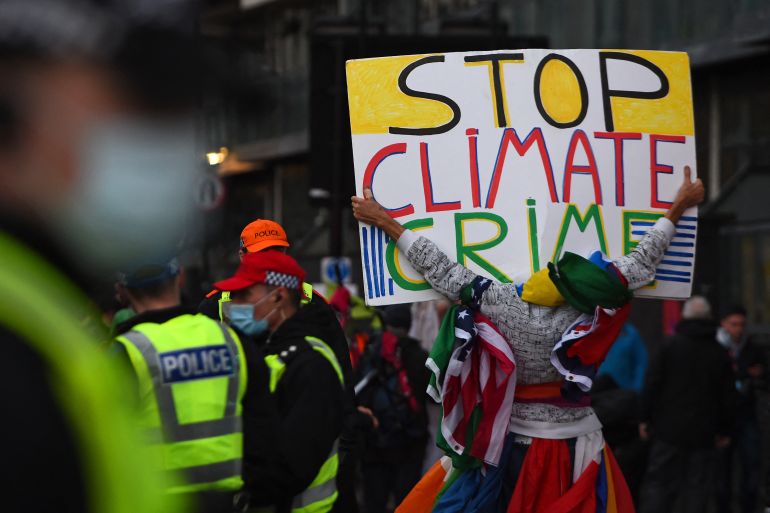
Negotiators at the United Nations COP26 climate crisis conference in Glasgow continue to bargain on how to stop catastrophic climate change on the summit’s final day.
After nearly two weeks of talks, the almost 200 countries represented at COP26 remain at odds over a number of issues, including how rich nations have a duty to compensate poor ones for damage caused by climate-driven disasters and how often nations should be required to update their emissions pledges.
Keep reading
list of 4 itemsCOP26 pledges ‘hollow’ unless fossil fuel subsidies end: UN chief
Climate vulnerable in the Global South demand COP26 action
COP26: Could oysters help to save Bangladesh from rising seas?
A new draft agreement was published on Friday, which while retaining a central demand for countries to set tougher climate pledges next year, used weaker language than a previous one in asking nations to phase out subsidies for fossil fuels, which are the prime man-made cause of global warming.
Meanwhile, protesters continued to rally outside the COP26 venue to push for a stronger deal.
This live blog is now closed. These were Friday’s updates, as they happened:
US, EU holding talks back: Gabon minister
Climate talks in Glasgow are at a “bit of a stalemate” and the United States, with support from the European Union, is holding back talks, according to Lee White, the Gabonese minister for forests and climate change.
White said Friday there’s a lack of trust between rich and poor nations over payments from rich countries to the poor for damage from the worst effects of global warming, funds for adapting to climate change and carbon markets.
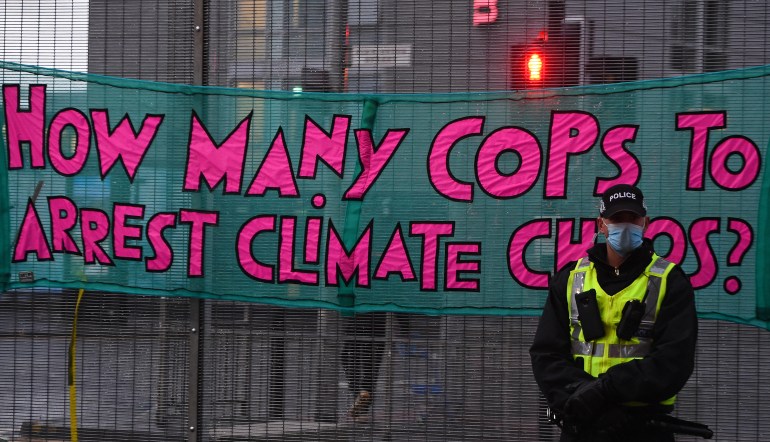
Amazon birds becoming smaller, longer-winged due to climate change
Even the wildest parts of the Amazon untouched by humanity are being impacted by anthropogenic climate change, according to new research.
Hotter, drier conditions over the past four decades are decreasing the rainforest birds’ body size while increasing their wingspans, a study published in the journal Science Advances.
The changes are thought to be a response to nutritional and physiological challenges, especially during the June to November dry season.
“In the middle of this pristine Amazon rainforest, we are seeing the global effects of climate change caused by people,” Vitek Jirinec, an associate ecologist at the Integral Ecology Research Center, said in a statement.
UN climate negotiations enter overtime
Government negotiators were still hard at work, going past 6pm, seeking consensus on controversial issues including the future of fossil fuels and money for poor countries to handle the effects of climate change.
Running late is not unusual for the UN-led negotiations. The previous climate conference, in the Spanish capital of Madrid in 2019, went well beyond its Friday evening deadline, ending on the following Sunday.
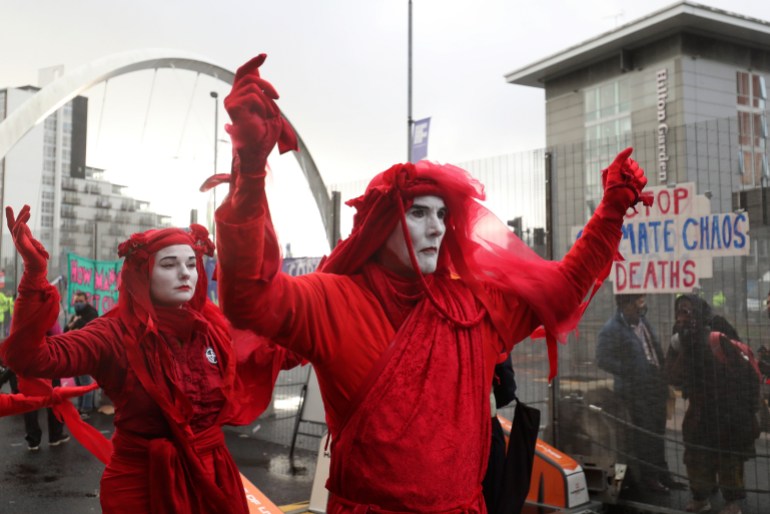
Feature: With oil boom, Guyana walks a tightrope on growth and climate
As world leaders wrap up United Nations climate negotiations in Glasgow, Scotland this week, the tiny South American nation of Guyana is attempting to strike a delicate balance between extracting energy to lift its people out of poverty and combatting the climate crisis which is threatening to put its capital city underwater by 2030.
Al Jazeera’s Chris Arsenault has this report.
Mood in stocktake plenary ‘constructive’: WWF
The global deputy head and climate lead for the World Wide Fund for Nature (WWF) says although negotiators were “up all night”, the mood at the informal stocktaking plenary in Glasgow was “constructive”.
“Countries here must maintain the urgency and science alignment references. But for Glasgow to live up to its promise to keep the 1.5C alive, they must make real progress in the next few hours to strengthen text on fossil fuels subsidies, robust carbon market integrity rules and on finance, especially for adaptation and loss and damage,” Vanessa Perez-Cirera said.
“We were pleasantly surprised by the amount of countries calling for these to be strongly reflected in the outcome text.”
Johnson urges rich nations to put ‘cash on the table’
UK Prime Minister Boris Johnson appealed to richer countries to place more “cash on the table” to achieve a breakthrough in Glasgow.
“That’s what needs to happen in the next few hours,” he said of his demand for money, adding that “we won’t clinch it all at COP, but we can start.”
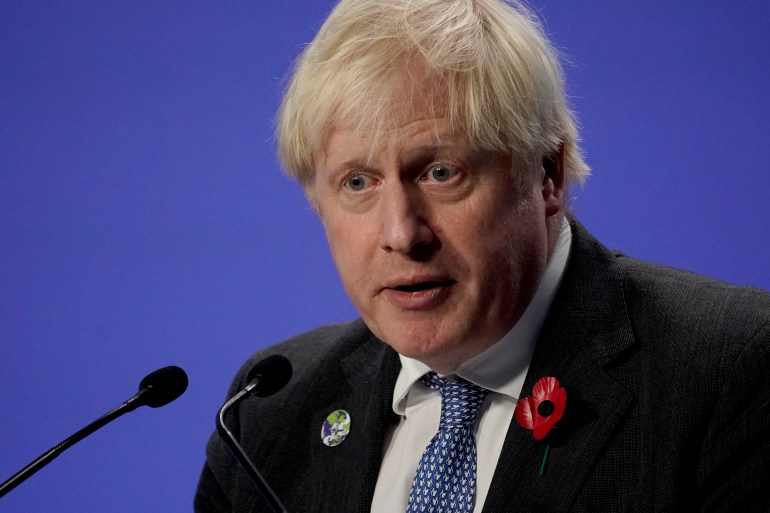
Current COP26 decision draft is ‘workable’: Saudi Arabia
The current draft for a decision text for the COP26 climate summit is “workable”, Saudi Arabia told a plenary meeting, after a call in a previous draft to phase out fossil fuel subsidies was changed to a reference to “inefficient” subsidies.
“The cover decision that you have put to us is something that is workable,” Ayman Shasly, Chair of the Arab Group at the conference, said.
Climate change making it more challenging for aid groups: Red Cross
Climate change is impacting ability of humanitarian agencies around the world to deal with catastrophes, Jagan Chapagain of the International Red Cross told Al Jazeera.
“The number of the climate-related disasters are increasing. Frequencies are increasing,” he said.
“The unpredictability of the of the climate related disasters is making it even worse for the planning. The demand on organisations like us (Red Cross) to also respond to climate-related disasters is increasing,” he said from Geneva.
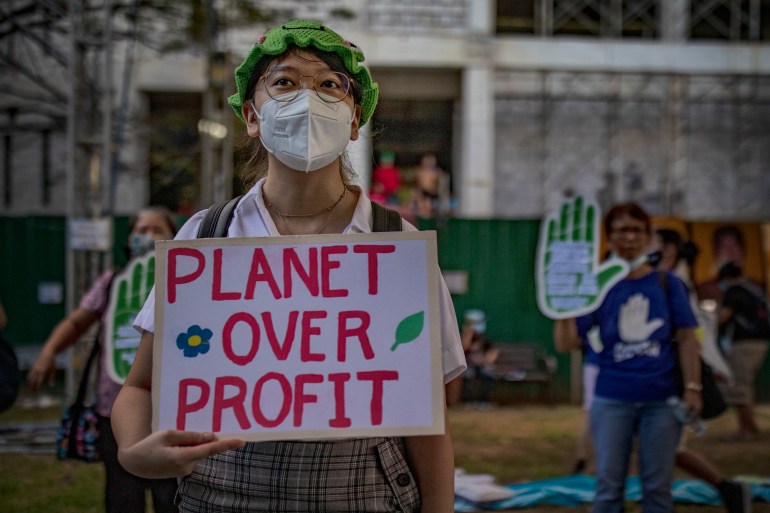
COP26 head Sharma hopes summit texts will be adopted later on Friday
Britain’s COP26 president, Alok Sharma, said he hoped nations at the United Nations climate summit would adopt texts later on Friday.
“My intention is to publish clean versions of relevant texts later today for parties’ careful consideration and, ultimately, I hope adoption tonight,” he told the Glasgow summit, which is slated to end on Friday but is expected to run overtime.
China calls for improvements on financing and adaptation
Chinese negotiator Zhao Yingmin said the draft deal in Glasgow must strengthen elements dealing with climate finance for developing countries and efforts to help them adapt to global warming.
Zhao added that countries should be able to decide for themselves on a timetable for implementing climate commitments.
Danish minister says ‘watering down’ of draft text ‘unfortunate’
Rewording of some crucial text of the draft agreement around coal and fossil fuels is “very unfortunate”, Danish Environment minister told Al Jazeera.
“Some of the very strong wording that was in there, for instance, with regards to fossil fuels and coal … is being watered down,” Dan Jorgensen said.
“So we are looking at I think probably 24 more hours of very hard negotiations. It’s not impossible, but it’s looking a little bit difficult now,” Jorgensen added.
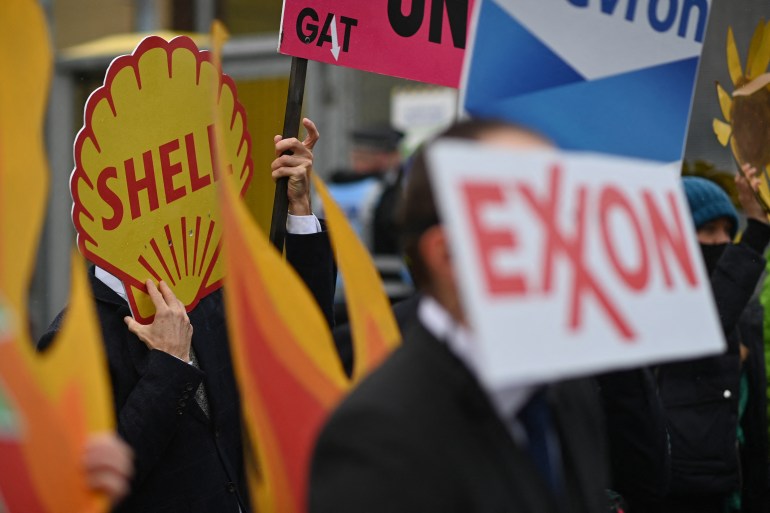
UK’s Johnson urges courage and conviction to agree on COP climate deal
Countries should have the courage and conviction to agree on a draft agreement at the UN climate conference in Glasgow, British Prime Minister Boris Johnson said.
“What I am saying to world leaders in all my conversations is: this is the moment. Tell your negotiating team how important this is, tell them to have the conviction and the courage to come together and agree that cover decision,” he said in a broadcast clip.
Reaching agreement is ‘personal’: EU climate chief
The European Union’s climate chief says clinching an agreement is a “personal” issue for negotiators at the UN climate talks in Glasgow because it will affect the lives of their children and grandchildren.
Frans Timmermans told fellow negotiators on Friday that he had received a picture of his grandson in the morning.
“If we succeed, he’ll be living in a world that’s livable,” Timmermans said. “If we fail, and I mean fail now in the next couple of years, he will fight with other human beings for water and food. That’s the stark reality we face.”
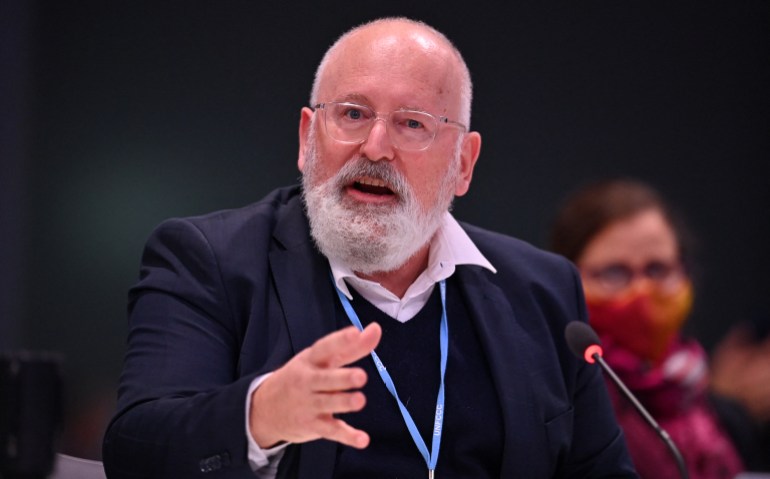
Fossil fuel subsidies ‘definition of insanity’: US
US climate envoy John Kerry said spending fortunes on fossil fuel subsidies was “the definition of insanity” as marathon COP26 talks inch towards a final reckoning.
Kerry said trillions of dollars have been spent on subsidies “in the last five or six years. That is the definition of insanity.”
“We’re the largest oil and gas producer in the world. We have some of those subsidies,” he said.
“Those subsidies have to go.”
EU says COP26 must send signal by halting fossil fuel subsidies
EU climate policy chief Frans Timmermans said on Friday the United Nations COP26 climate summit should send a clear signal by halting fossil fuel subsidies.
“The COP must also send a clear signal about our commitment to halt fossil fuel subsidies and finally turn the page on coal,” he told the summit in Glasgow.
“We need to make sure major emitters reduce their emissions so we keep 1.5 alive. That needs to be at the heart of our conclusions today,” he added to applause from the hall.
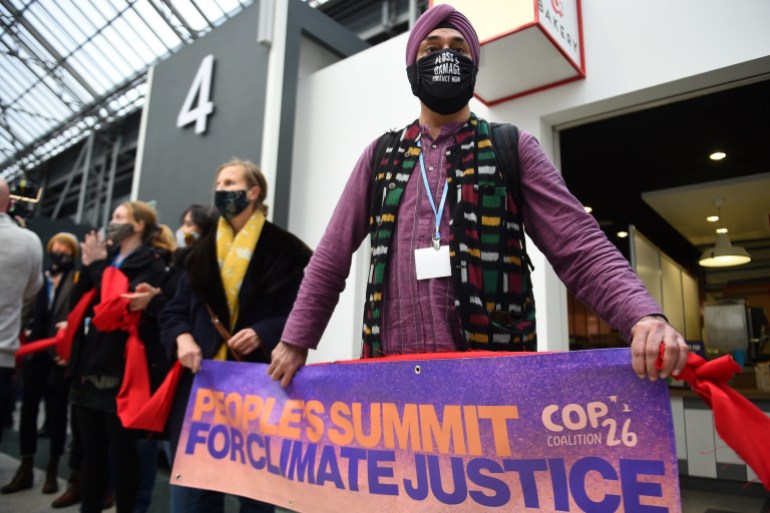
Feature: Is nuclear power the way forward to combat the climate crisis?
As the United Nations Climate Change Conference (COP26) wraps up and countries prepare to throw a lot more money towards decarbonising their economies, the debate over the role nuclear energy should play in achieving net-zero targets is heating up.
Al Jazeera Digital’s Managing Business Editor Patricia Sabga sat down with Allison Macfarlane, the former head of the US Nuclear Regulatory Commission, to explore the pros and cons of countries building more nuclear power plants to try and save the planet.
Read more here.